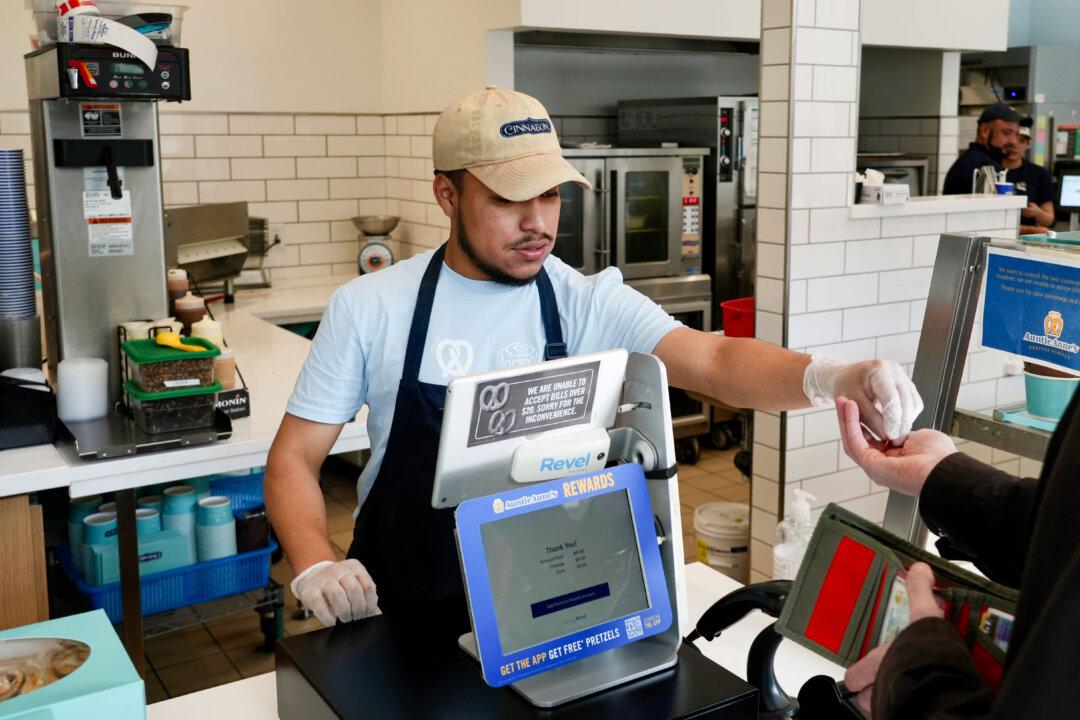Last year, the State of New York, on a tax of 51 percent for gross gaming and mobile sports betting, made $909 million. Of that total, $6 million or a little more than 5 percent, went to the New York Council on Problem Gambling, a state-funded non-profit agency inundated with boys and men between the ages of 16 and 30 looking for help and resources. But New York is just one of 34 states trying to counter a legalized gambling tide of $220 billion spent on sports alone since the U.S. Supreme Court allowed states to allow legal gambling in 2018.
“For me, as a person with boots on the ground, it does sometimes feel like screaming into a void,” Pamela Brenner-Davis, a team leader of the New York Council on Problem Gambling (NYCPG), told The Epoch Times. “They call gambling the hidden addiction, but with the advent of mobile betting, you can now gamble away every dollar without anyone knowing it.”
Led by giants FanDuel and DraftKings, the total sports betting advertising spend in 2023 is expected to reach $2 billion, according to audience insights platform Disqo. That total represents an 8 percent increase from 2022.
While you might think this type of media advertising is limited to sports sponsorships and sports broadcast programming, TV ad measurement company iSpot found sportsbook ads are airing at increasing levels on non-sports programs, such as re-runs of Friends, On Patrol: Live, South Park, and Young Sheldon. Those shows rank in the top 10 of national television sportsbook ad impressions.
“I can’t put a cannabis billboard within a hundred feet of a school or buy an ad on Monday Night Football. We have to ask, are we violating anything here?” Dr. Timothy Fong, the co-director of the UCLA Gambling Studies Program, told The Epoch Times. “The problem is there’s no enforcement and no penalties in part because you don’t have any state regulators with the power to do it. If you market directly to an 18-year-old person who is not legally allowed to do your activity, that should be against the law.”
Dr. Fong, a psychiatrist who works with gambling addicts, says his youngest patients are 14 years old. Only the state of Kentucky legally allows gamblers as young as 18, but Fong says that plenty of people under the age of 21 have gained access to their parents’ accounts.
The Addiction Crisis
Though a diagnosable and chronic mental health disorder, gambling addiction, unlike alcohol addiction, is rarely discussed in that manner. Most tend to view problem gambling as a lesser addiction, but the National Association of Addiction Professionals says gambling has the highest addiction suicide attempt rate at 20 percent.
“Since the legalization of online gambling, in five years, our [gambling] helpline calls since have gone up 288%,” Felicia Grondin, the executive director of the Council on Compulsive Gambling of New Jersey, told The Epoch Times. “There needs to be some sort of restriction on advertising. Why is there alcohol and cigarette bans but not online gambling? We need a warning label informing people that gambling can become addictive. The other issue is that no one ever talks about the dark side. People are afraid to disclose their losses.”
Dr. Fong agreed with that assessment. “I don’t see people posting on social media the bets they didn’t win. And at what point do we say we don’t want to gamify everything?”
More than half of American adults now live in a legal sports-betting market and gambling enterprises have had record-breaking revenue while contributing millions in tax revenue to states that don’t want to see that money disappear from their budgets. This makes states reticent to eliminate sports gambling in their states despite the toll it’s taking on adults and even kids. But some say parents, not governments, need to step up and take a more active role, especially regarding college-age gamblers.
“Fantasy and sports betting comes with risks,” said Brianne Doura-Schawohl, one of the few lobbyists in Washington speaking to legislators about problem gambling issues. “When kids come home from college, parents ask about unprotected sex and alcohol and parties. How many of them are asking the kids about gambling? None.”
She told The Epoch Times that there is little present hope for any new regulations coming out of the Capitol protecting young men. “The Biden administration has done nothing on this issue and no one in Congress has filed any legislative bills. It’s the hidden addition when it comes to policy, too. The implications are so catastrophic. It’s time we bring it into the light and it’s coming at a real cost to the country.”
The National Council on Problem Gambling (NCPG) estimates the annual national social cost of problem gambling is $7 billion. Those costs include gambling-related criminal justice and healthcare spending, job loss, bankruptcy, and other consequences. The Council believes the symptoms of problem gambling and substance abuse disorders are very similar, with both showing higher-than-average rates of depression, anxiety, and suicidal behavior.
“It’s appalling to me that in the last five years since we’ve legalized gambling, only one state has by law put mandatory education about gambling harm in their laws,” Ms. Doura-Schawohl added, referring to Virginia. “They realized it had come with a real cost. And it’s not always something that is viewed as financial in nature. Because if you’re giving up sleep and compromising your job and your family, that’s an issue.”
Ms. Brenner-Davis says the big players in online gambling aren’t doing enough to warn people, especially young people, how addictive their apps are. “They do a great job of saying a lot about their responsible gambling work because they’re required to. We need them to understand the community-wide impact of this and they need to partner at the state level to address the problem. I’m sure they’ve read the suicide numbers.”





